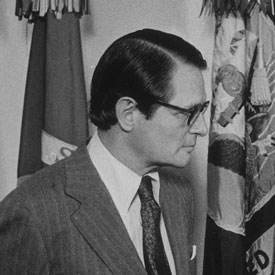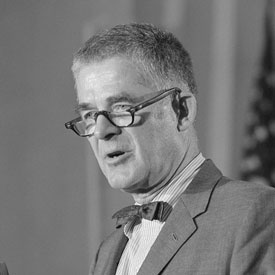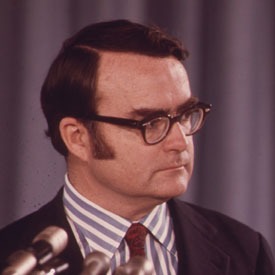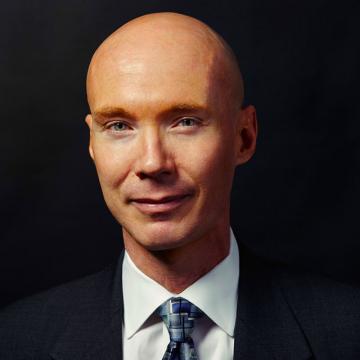Three little words
Does Trump's firing of FBI Director James Comey echo Nixon?
Three little Nixonian words swept the web at the news President Trump had fired FBI Director James Comey: “Saturday Night Massacre.” But whether this president shares Nixon’s fate will depend on whether the firing falls into a category captured by three other Nixonian words: “obstruction of justice.”
The Saturday Night Massacre was a milestone in the Watergate scandal, but Nixon’s firing of special prosecutor Archibald Cox (and the resignations-in-protest of the top two officials in the Justice Department, Attorney General Elliot Richardson and deputy AG William Ruckelshaus) ultimately did not stop the investigation.
Trump's decision to fire James Comey drew instant comparisons to Richard Nixon's Saturday Night Massacre https://t.co/RElKeGpjtC
— The New York Times (@nytimes) May 9, 2017
Cox’s replacement, Leon Jaworski, proved just as formidible as his predecessor. Also, like Cox, Jaworski demanded to hear Nixon’s no-longer-secret White House tapes, and fought the president all the way to the Supreme Court to force Nixon to turn over the recorded evidence.
That evidence is ultimately what forced Nixon out of the White house, because the tapes captured the president committing the crime known as “obstruction of justice.” You’ve heard that “the cover-up was worse than the crime.” Covering up a crime—interfering with a criminal investigation—is itself a crime, and “obstruction of justice” is its legal name. Obstruction of justice was the high crime mentioned in the first article of impeachment against Nixon.
The famous “smoking gun” tape of June 23, 1972, captured Nixon committing obstruction of justice by using the CIA to interfere with the FBI’s investigation of Watergate.
(Listen to the audio with a transcript here.)
When that tape became public (thanks to Cox, Jaworski, and the Supreme Court) Nixon had to resign.
Obstruction of justice was also the high crime mentioned in the third article of impeachment against President Bill Clinton.
The firing of Comey immediately raised the question of whether President Trump was trying to interfere with the FBI’s investigation of the Trump presidential campaign’s ties to Russia.
According to the White House, the answer is no. The official explanation is that Comey was fired for his handling of the investigation of Hillary Clinton’s emails. But there’s a problem with that explanation. During his campaign, Trump publicly praised Comey for some of the very same acts that he is supposedly firing him for now—such as Comey’s public criticism of Clinton’s use of a private email server and his sending a letter to Congress shortly before Election Day announcing that the investigation was reopened. President Trump now condemns what candidate Trump once cheered.
Even some Republicans are having a hard time swallowing it.
I've spent the last several hours trying to find an acceptable rationale for the timing of Comey's firing. I just can't do it.
— Jeff Flake (@JeffFlake) May 10, 2017
I am troubled by the timing and reasoning of Director Comey’s termination.
— Richard Burr (@SenatorBurr) May 9, 2017
My staff and I are reviewing legislation to establish an independent commission on Russia. The second paragraph of this letter is bizarre. https://t.co/wXeDtVIQiP
— Justin Amash (@justinamash) May 9, 2017
Whoever continues the Russia investigation will now have a new question to investigate: whether the firing of the FBI director amounted to obstruction of justice. On such questions entire presidencies have turned.
Read Senator Ted Kennedy's account of the Saturday Night Massacre

When Watergate special prosecutor Archibald Cox subpoenaed audio tape recordings of Nixon’s conversations in the White House, Nixon refused to turn them over. His idea for a compromise? For Nixon-friendly Senator John Stennis to listen to the tapes instead, and then pass along a summary to prosecutor Cox. “Stennis—who had been the chairman of the Armed Services Committee, a very close friend of Nixon—was known as a man of very considerable integrity,” Senator Edward M. Kennedy recalled in his oral history with the Miller Center, “but he was also known to be a man who was hard of hearing.” (To fully appreciate the clarity of Nixon's tapes, and therefore how hard it would have been for Stennis, listen here.)
Not surprisingly, Cox turned down the Stennis compromise. And Nixon fired him—a move that prompted the resignations of Attorney General Elliot Richardson and his deputy, William Ruckelshaus. The "Saturday Night Massacre," as it became known, inspired outrage among the American public.
In Senator Kennedy's Miller Center oral history, he provides a blow-by-blow of the lead-up to the Saturday Night Massacre. It is particularly relevant to the 2017 firing of FBI Director James Comey for two reasons. First, Senator Kennedy emphasized that the confirmation of Richardson as attorney general was dependent upon him agreeing to appoint a special Watergate prosecutor. Why is that relevant? Because a new FBI director will have to be confirmed, and senators will have to ask if he or she will appoint a special prosecutor for the Trump-Russia investigation—and if he or she will stand steadfastly behind the investigation, regardless of who conducts it. The second reason Senator Kennedy’s account resonates is that it highlights just how unusual the Comey firing was. Public servants are typically allowed to resign before they’re fired. Comey was blindsided.
Here is Kennedy's compelling recollection (read full transcript here).
Kennedy
This is the other very important part, the selection of Elliot Richardson to be Attorney General, and who was going to be the independent prosecutor to investigate all this. That was really the issue we were looking at when Elliot Richardson was nominated. This was probably in April/May [1973]. At the end of April, Kleindienst resigned over the scandal. Now we’re into May, and Elliot Richardson has been selected by Nixon to be the Attorney General. And he’s looking around as to whom he should select as the Justice Department’s special prosecutor.

I had talked to Richardson at the time of his confirmation and had been very clear that he wasn’t going to get confirmed unless he appointed a special prosecutor. This was not something that came up from the White House about I want a special prosecutor to look into me. It’s nothing that Elliot Richardson wanted. We wanted it, and I played a role with others on the committee. This was a quid pro quo for his being able to get through. Although he was well qualified, he would not have gotten through the Senate Judiciary Committee unless he appointed a special prosecutor. He understood that. We had had private conversations with him, and he understood it.
Q
Why in the world would he want to take on that job? He had been Secretary of Defense, hadn’t he?
Kennedy
Well, he had been Secretary of HEW [Health, Education and Welfare]. He had had a whole series of jobs. I think he was Defense Secretary at the time. In any event, he was not going to get it unless he had an independent prosecutor. The question then was whom he was going to get and what the mandate of the special prosecutor was going to be. He went to three different people: he went to a fellow named Harold Tyler, whom President [John Fitzgerald] Kennedy had appointed to be a federal judge and who was a very distinguished—but very conservative—judge, highly regarded and respected, but very tough. It was really a question of whether he would be willing to be tough enough on the administration or whether he was so much law and order that he might not be willing to go after and follow the pathway of deceit and lies and cover-up.
I talked to Tyler. He understood that he needed to get a broad mandate to have this be a worthwhile endeavor. He was in the process of talking to Richardson about that mandate, and Richardson gave him, in effect, an ultimatum. He said, You have to make your mind up, I think, within a matter of hours. He said no, he wouldn’t do it.
Next he went to Warren Christopher, who, as we know, was a distinguished attorney and later worked as a Deputy Secretary of State, a person of extraordinary integrity and respect in the country. He was given the same kinds of issues and questions about the mandate, and he was unwilling to take it.
Elliot Richardson then went to Archie Cox. He had been interested in going to Cox in the beginning, but he didn’t think Cox had the prosecutorial experience. But he realized that he had to get this job filled, and he needed somebody who would command universal respect.
Q
Were all of those people Richardson’s choice? What did you have to do with it?
Kennedy
Well, I talked to all of them. I knew Archie Cox from the time he had been Solicitor General for President Kennedy, and I’d known him from the time he had advised my brother as a Senator. I knew him as one of the extraordinary figures of ability and intelligence and integrity. I had met Warren Christopher. I didn’t know him well, but I knew his reputation, and I knew the reputation of Tyler. I had met him.
But by this time, the committee and the Democrats on it were very involved, very active, and intersecting both with Richardson and these nominees, as I was. And we come to the time where Cox effectively agrees to take the job, if he can get a strong mandate. It takes a lot of pulling and hauling—and a lot of conversations.
Elliot wants him very badly, but only at the very end agrees that the only condition under which he can fire Archie Cox is if there’s extraordinary impropriety. Otherwise, Cox is absolutely free to go wherever the trail leads him. Those were the only circumstances under which he could fire him.
Both were sworn in, I believe about the same day. I remember attending Archie’s. I was trying to remember who had sworn him in. We can get that, probably, from Jim. I remember attending that occasion.
Q
Do you remember how the special prosecutor played into Richardson’s confirmation hearings?
Kennedy
Well, as I mentioned earlier, Richardson would not have gotten approved unless he appointed a special prosecutor, one who had a strong independent mandate. I think Richardson was trying to have it both ways—to have an independent prosecutor, but to have a less strenuous mandate. And only at the very end was he willing to agree that the words I mentioned would be the operative words if there was going to be a difference, a disagreement, and if there had to be a firing.
Q
But am I right in thinking that the problem here, the need for that special mandate as a matter of law, was the fear or the prospect that Nixon himself would instruct his Attorney General to fire or not to? And the Attorney General would be in the position of defying the President, because he would have no mandate, no agreement prior, that the man could not be fired.
Kennedy
Well, basically, by this time, it was whether they were going to get to the bottom of it all, effectively, or whether the President was going to be able to subvert any investigation by firing people—which he eventually did—and whether the special prosecutor was going to have enough juice to at least create a sufficient row to stir up the public. All of which he did, but which he wouldn’t have been able to do unless his power and authority and independence were so clear and evident. That’s what was at stake in this.
Now, there was an interesting situation going on about this time. We’re in May now. (Archie Cox was in from May 25 to October 20, a very short period of time.) The key element now is we know there are tapes on which the President has recorded conversations. And whether the tapes were going to get out and be public became the subject of court proceedings.
The district court held during the course of the summer that they should be. And there became what was known as the proposed [John] Stennis Compromise. The district court said they should be made public—we’re looking at the fall now. Stennis—who had been the chairman of the Armed Services Committee, a very close friend of Nixon—was known as a man of very considerable integrity, but he was also known to be a man who was hard of hearing.
In the proposal, President Nixon tells Elliot to tell Archie that Stennis will listen to the tapes and send a summary to Archie Cox. At that time Archie was not all that unwilling to follow that process. But eventually he said no, that wasn’t going to hold. And that began to precipitate what was going to be the Saturday Night Massacre.
…
Kennedy

I think I misspoke when I said that Cox was prepared to accept the [Stennis] Compromise early on. He was not. It was proposed to him, and I think history will show he was not opposed to try to look for some kind of compromise. But when it was ultimately selected, he clearly turned it down decisively and clearly.
The one other point I want to emphasize is the fact that when we had Richardson before the committee in Spring 1973 and were looking at that mandate for the independent prosecutor, I told him in no uncertain terms that the prosecutor’s mandate would have to be strong. We presented him with specific changes that needed to be made, and the sticking point was the power to fire the prosecutor. We told him that for his own good there should be a clear, very high standard for firing the prosecutor. And we personally negotiated the ultimate standard with him: his promise not to fire the prosecutor unless he found extraordinary impropriety in Archie’s performance. It was this standard that led to the Saturday Night Massacre five months later, when Nixon ordered Richardson to fire Cox, but Richardson refused and resigned instead because Archie had committed no such improprieties. I think that was the key.
That week Archie was named, the Ervin committee began its hearings, further unraveling the cover-up: Dean’s testimony in June that Nixon was involved in the cover-up, disclosures in July that Nixon had been taping conversation, and both Cox and Ervin were demanding the tapes. Nixon refused, leading to the legal battle over the tapes in the summer and early fall.
Q
So both the Senate committee and Cox demanded the tapes, and Nixon refused.
Kennedy
Both of them. Then on October 10, [Spiro T.] Agnew resigns. We issued a sympathetic statement about him: He deserves compassion and respect of the nation for his decision to spare the country the ordeal of the indictment and trial of a sitting Vice President. This is obviously in contrast to what we were looking at in terms of Nixon.
Q
No connection.
Kennedy
No connection. That was all dealing with bribery and tax evasion. Now we have Nixon nominating Ford to replace Agnew.
Q
Do you know how that came about?
Kennedy
I don’t know. Ford had been the Republican leader in Congress and was very well regarded among Republicans, and I imagine not a particularly threatening figure to Nixon, not a competitive figure with him. I don’t know who he was looking at and who he was thinking of as other options. I guess one other name was [Nelson A.] Rockefeller. It was batted around for a day or something, but that went down quickly.
In September, I had talked with Phil Hart of the Judiciary Committee about trying to get Vice Presidential confirmation hearings in the Judiciary Committee as they were in the House. I raised this with Mansfield and Hart and Bayh, and I had had a meeting with [Robert] Byrd and [Howard] Cannon, and [Marlow] Cook of Kentucky. Byrd, Cannon, and Cook were pushing for the Rules [Committee] to hold the hearing, but we pointed out that we had been the ones who had been having the hearings on all of this background, and we hold hearings on judges and Supreme Courts. We’re the committee that knows how to hold the hearings, and the Rules Committee just deals with the rules, primarily guiding the Senate.
But the parliamentarian said that the jurisdiction fell under Rules, which covers matters of Presidential succession. They covered the matters technically. For example, the Rules Committee would outline the rules in terms of impeachment. But it seems to me that the rules of succession in these circumstances called for the Judiciary Committee. Nonetheless, it was the Judiciary Committee in the House and the Rules Committee in the Senate. The Rules Committee in the Senate didn’t do a great deal. Actually, it was an issue that was going to be all decided by the House. At the time of the Ford selection, we had Watergate coming to a head and the D.C. Circuit Court of Appeals upholding [John] Sirica’s ruling that Nixon had to turn over the tapes.
Q
And impeachment is in the air.
Kennedy
Impeachment is in the air. We had the White House discussing with Cox and the Watergate Committee the compromise under which Stennis would listen to the tapes and prepare summaries. I opposed this and spoke on the floor about the relationship between the Watergate tapes and the Vice Presidential confirmation. I argued that if there was no compromise on the tapes, and the Supreme Court upheld the D.C. Circuit, there could be no question the President had an obligation to abide by the Supreme Court decision. And if the President defied the Supreme Court on the tapes, he defied the Constitution, and the House would have no recourse but to exercise its power of impeachment.
In those times, we talked about impeachment, compared to these days when we’re very reluctant in the face of abuse of Presidential power to even mention it. This speech was done two days before the Saturday Night Massacre. I said that Ford must be asked whether he believed the President must comply with an order of the Supreme Court to disclose the tapes, and if he says no, then Congress has the duty to refuse his confirmation.
Q
Was the question asked?
Kennedy
I’m not sure. We ought to find that out.
Q
That would have been before the Rules Committee?
Kennedy
Before the Rules Committee. So we move toward the week of October 13 and the Saturday Night Massacre. Evidently, Cox had been in discussion with Richardson during this period, but it was very clear that the White House wanted restrictions.
Q
What is not clear—although it’s not an earth-shaking detail—is whether Richardson ever ordered Cox to abide by the Nixon ruling. Apparently he did not, because on October 20 Archibald Cox refused to accept the Stennis Compromise. (That’s in Jim Flug’s timeline.) But apparently he was never ordered by Richardson to accept it. They only discussed it, as far as I can see.
Kennedy
Well, that’s the way it was reported. That’s on October 20. Cox refused to accept the compromise, and Nixon ordered Richardson to fire Cox. Richardson refused and resigned in protest, and [Robert H.] Bork fired Cox.
Q
Well, the next one was [William D.] Ruckelshaus. He was made acting Attorney General, wasn’t he?—and given the same order, and he refused.
Kennedy

And then Ruckelshaus refused to fire—
Q
And then Bork.
Kennedy
President Nixon abolished the prosecutor’s office, turned the case over to Justice, and put FBI guards around the offices of Richardson, Ruckelshaus, and Cox. I issued a statement about this being a reckless act of desperation by a President who’s afraid of the Supreme Court, has no respect for law and no regard for a man of conscience.Then I said, The burden is now on Congress and the courts to nullify that historic insult to the rule of law and the nation’s system of justice.
We had met on Friday night. I met Sunday with Hart and [Charles] Mathias and my staff at my home. We had some suggestions for a censure resolution that Burke Marshall helped draft, and we talked about having a Judiciary Committee meeting. I talked to Clark Clifford, who advised in favor of a hearing and against censure. He seemed to be already focused on impeachment, but he thought the House would resent encroachment on their Constitutional role in initiating impeachment, and that censure might be a slap on the wrist that might deflate the fact that something more significant could be done.
Q
Well actually, on the day before that 23rd meeting, the House Democratic leaders tentatively agreed to begin a pre-impeachment inquiry. Then on the 23rd, Nixon agreed to hand over the tapes to comply with a subpoena, and you had this meeting. That was all happening on the same day. There’s movement on all kinds of different fronts. So apparently when Clifford was already thinking impeachment, he was attuned to the fact that the House was moving. Jim Flug says you called [Peter] Rodino at that period and also Massachusetts Congressman Eddie Boland and House Speaker Tip [Thomas Phillip] O’Neill about the pre-impeachment.
Kennedy
Yes, I was urging House Judiciary Committee chairman Rodino to go ahead and Tip to move favorably and Eddie Boland to stay after Tip. I called Eastland as soon as this happened, and my recollection is that he was in Turkey. We can verify this, but I have a clear understanding of a lot of these things. I remember calling him, and he said he had heard it. I said, Can we have a hearing on this? We need to have a hearing. He said, We can have it, but why don’t we have a preliminary meeting next Wednesday? It sounds all right to me. If it sounds all right, you check with other members of the committee and find out. I remember calling him and him basically giving me the okay to go ahead with the hearing. We had a preliminary meeting on this on Wednesday, had the hearing Saturday night, and the Judiciary Committee a week from that Monday.
Q
And the hearing was to be on the Cox firing?
Kennedy
On the Cox firing. We were going to have a witness, Elliot Richardson, and review the commitment made to the Judiciary Committee and review the language we had worked out in the mandate for the special prosecutor. All the conditions demonstrate the hijacking of Constitutional law, the checks and balances in this circumstance. We had a meeting in the Judiciary Committee on that Wednesday. We had set Monday for the hearing, and there was a lot of mumbling about it because there wasn’t a seven-day notice. There has to be a seven-day notice. I offered a resolution to waive it—which would be waiving the rules of the committee—and that got people worked up. But they finally agreed to have the hearing on Monday.
